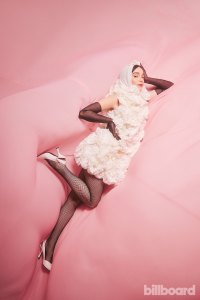Did you come in when I was dressed like a sperm?”
Despite her wry tone, Annie Clark — the artist better known as St. Vincent — isn’t joking. Not quite an hour earlier, Clark was posing for her Billboard photo shoot in a hooded, ruffled cream mini-dress in front of a billowing blush-pink backdrop meant to evoke a different bit of human anatomy. (Let’s just say the setup was a spiritual descendant of Georgia O’Keeffe’s work.)
As St. Vincent, Clark conjures an enigmatic, opaque aura. But today, she’s in a frank, funny and freewheeling mood. She jests about the suggestive pictures of female models plastered on the walls around us (“Boner patrol, look out!”) and swerves easily from topics highbrow (abstract Russian painter Kazimir Malevich) to low (an off-and-on gamer, she was briefly obsessed with The Legend of Zelda: Breath of the Wild). Clark chose to soundtrack her shoot with David Bowie’s coke-fueled 1976 classic, Station to Station, and as we gush over it, the singer-songwriter gives her beige Prada jacket a little shake. “I do like to think this trench coat is giving ‘Dancing in the Street,’ ” she says, referencing the outrageously ’80s music video for Bowie and Mick Jagger’s hit cover. “Minus the cocaine.”
Much like Clark herself, St. Vincent’s Grammy Award-winning output — which has run the gamut from twee indie to ass-kicking art-rock to conceptual electropop — is an arresting mix of the intellect and the id. Her latest album, All Born Screaming, can be experienced as an atavistic staring contest with existence — or simply as a rippin’ alt-rock record.
Trending on Billboard
“It’s about life and death and love,” she explains. “And that’s it.” For the 41-year-old Clark, at least two of those topics are intrinsically linked to her own identity as a queer artist. “Every record I’ve ever made has been so personal about what’s going on in my life at any given time. I’m queer. I know how to code-switch. The idea of identity as performance has been very clear to me since I was a child.” Even so, Clark shuts down the suggestion that she adopted a mask or performative identity for the album: “I’m queer, I’m living in multitudes, but this record in particular is not about persona or deconstruction.”
Shushu/Tong dress and headpiece, Zhilyova gloves, BY FAR shoes.
Lenne Chai
Code-switching — changing one’s behavior to suit an uncomfortable environment — is nothing new for LGBTQ+ people. Even in the generally progressive-minded music community, Clark says the world queer musicians currently inhabit is “very different” than when she kicked off her recording career in 2006 with the three-song EP Paris Is Burning. “Which is one of those things which gives me a lot of hope,” she notes. “I know there are certain things in the world trending in a scary direction, but all in all, I’d rather live right now than any other time in history. We wouldn’t be having this conversation 60 years ago. I would be a nurse, I would be a secretary, or I would be a mother.”
When I suggest that 60 years ago, I would have been pushed into a heterosexual union and having same-sex dalliances on the down-low, she laughs and perks up. “Exactly! You would have a beautiful wife at home and would be getting your d–k sucked at the whatever. And you’d never know if it was a cop [trying to entrap you].”
As she references the hankie code (as early as the ’70s, gay men used different-colored bandannas to signify sexual preferences) and Hal Fischer’s 1977 photo book, Gay Semiotics: A Photographic Study of Visual Coding Among Homosexual Men, it’s clear Clark knows her queer history. “People the world was hostile to developed these secret languages, secret codes, in order to communicate. I find that fascinating,” she says. “You’re very aware there’s a subterranean, subtext layer to everything that’s going on — and you have your antennae up at all times. That is erotic to me. But I’m glad that [I live in this era].”
As for the downside to LGBTQ+ culture going mainstream? “Well, if you’re safe for the TV screen, you also invite an aspect of grift [from the outside world],” she muses. “Which… I raise an eyebrow at.” To emphasize her point, she cocks her left brow; for a moment, she could pass for a hyperlogical Vulcan on Star Trek. “But there have been plenty of queer people in music. Even if the culture was saying no, there were always queer people in the arts. Please. We have built this.”
For a college dropout, Clark has done pretty well for herself. Born in Tulsa, Okla., she relocated to Texas as a child when her mother moved her and two older sisters to Dallas following her parents’ divorce. (Clark now has four brothers and four sisters from the combined families.) Her childhood obsession with the guitar, ignited by the 1987 Ritchie Valens biopic La Bamba starring Lou Diamond Phillips, became serious as she entered her teen years, and a stint as a roadie for her uncle’s jazz-folk duo, Tuck & Patti, gave Clark her first taste of the touring business.
Clark attended Boston’s prestigious Berklee College of Music but left after three years (though her parents didn’t find out until several years later, when they read it in the press). “Other people have real educations,” she says. “I had philosophy teachers who were like, ‘How is Kierkegaard like Bob Marley?’ ” She shakes her head, almost tenderly. “It’s not. It’s not and that’s fine.” (When I ask how a music school dropout seems to have an endless fount of cultural, historical and artistic references at her disposal, she laughs and asks, “Is that your way of saying, ‘It’s OK you never went to real college’?”)
After cutting herself loose from Berklee, Clark spent 2005 and 2006 on the road with the robe-rocking, symphonic indie outfit Polyphonic Spree, joining Sufjan Stevens’ touring band for a spell shortly thereafter. Her solo debut album, Marry Me, released in 2007 on Beggars Banquet, was a chamber-pop cauldron with notes of Stevens and Spree, but had a playful, wry sense of humor that indicated it was just the tip of the St. Vincent iceberg. (For one thing, the album takes its title from a running joke on Arrested Development — a fact that today causes Clark to rest her head on her fingertips in faux embarrassment before concluding, “It is a great show.”)
On her next release, Actor, Clark’s music developed a jagged, sardonic bite that brought her to the Billboard 200 for the first time (at No. 90). Her top 20 follow-up, the 2011 art-rock statement Strange Mercy, was tinged with pain, fury, self-doubt and confusion — and dispelled any lingering misconceptions that she was a holdover from the demure, precious indie pop of the ’00s. While Clark had always seemed like an artist with something to say, on Strange Mercy, she sounded like an artist who needed to say something.
“In order to get good, you have to go through a series of humbling and humiliating experiences,” she reflects. “On the other hand, you have to have this psychotic belief — an unreasonable belief, truly — that you are going to write songs and make music that is going to matter. And that’s a really crazy thought.” She pauses. “I have that thought — with plenty of self-loathing and self-laceration — but I also have this [feeling], ‘If I don’t do this, I’m going to die.’ ”

Camilla and Marc shirt, Nour Hammour coat, Zhilyova gloves.
Lenne Chai
Among those who took notice of Clark’s creativity and drive was Talking Heads legend and fellow rock eccentric David Byrne. Their 2012 collaborative album, the funky, brass-heavy Love This Giant, netted Byrne his first top 40 entry outside Talking Heads on the Billboard 200.
“Annie is so many things all at once,” Byrne tells Billboard. “Beautiful, inventive, inscrutable — in the best way possible. I know her as someone warm and friendly, but as anyone listening to her music can hear, she’s got a dark side that as far as I know just has an outlet in her music. Would that all of us could do that.”
After a lengthy tour with Byrne — “I love playing shows. I’m up there, and truly, something else kicks in,” Clark emphasizes — she solidified her reputation as an art-rock auteur on her self-titled fourth album, the first of three on Loma Vista, in 2014. With a chromatic purple-blue-pink palette and a gray ’do teased to the heavens, Clark delivered the most stylistically cohesive St. Vincent album yet — and for the first time on wax, she sounded like she was having a blast. St. Vincent won Clark a Grammy for best alternative music album, kicking off an active streak of her collecting at least one Grammy per proper studio release since. In 2014, Clark also spoke publicly about her queerness for the first time, telling Rolling Stone, “I believe in gender fluidity and sexual fluidity.”
With 2017’s Masseduction, Clark pivoted to electropop and paired it with neon-drenched, latex-heavy visuals, as well as some of her most personal songs yet. Co-produced by Jack Antonoff, the album (her first top 10 entry on the Billboard 200) expanded her creative circle to include a range of musicians such as Sounwave, Kamasi Washington, Jenny Lewis, Mike Elizondo, Pino Palladino and Cara Delevingne (the latter of whom Clark dated for a year and a half, briefly putting her in the tabloid spotlight). Masseduction singles “New York” and “Los Ageless” hit the Adult Alternative Airplay and Hot Rock & Alternative Songs charts, and the title track won her the Grammy for best rock song. Not that she’s in it for the accolades: “I’m a musician because I’m obsessed with making music,” Clark states. “If I wasn’t, God knows, I don’t think it would be pretty.”
As her profile grew, Clark earned her first GLAAD Media Award nomination for outstanding music artist in 2018; that June, she unleashed “Fast Slow Disco,” a dancefloor remix of one of Masseduction’s tracks, along with a music video where she cavorted with a throng of leather-clad men making out with one another. “Happy Pride,” she tweeted. “It was sweet of these boys to let me crash their party.”
Fittingly, the tune’s title was inspired by a text message exchange with Wendy Melvoin, whose romantic relationship with Lisa Coleman in Prince’s backing band The Revolution provided sorely needed representation in the ’80s. “Annie’s a real artist. It’s always satisfying to be friends and compatriots with people that you have respect for,” Melvoin says. “She’s extremely talented,” Coleman agrees. “[She’s] a real musician that was so influenced by what we did, and she had a reverence for us. It was easy to return that because she is so good.”
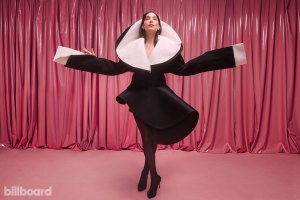
St. Vincent wearing Ultra Open Earbuds by @Bose and Maggi Simpkins.
Lenne Chai
By 2021’s Daddy’s Home, Clark had nothing left to prove, which might explain why the album — partially inspired by her father’s 2019 release from prison after he served time for a stock manipulation scheme — was her first where she looked backward for inspiration. (Then again, maybe she meant it literally when she titled her 2017-18 tour Fear the Future.) Steeped in ’70s rock, AM pop and queer camp, the album netted her another Grammy for best alternative music album and another GLAAD nomination for outstanding music artist. As a victory lap and era-appropriate tie-in, she supplemented her own headlining trek for the record with a stint opening for Roxy Music’s farewell tour.
Beyond Roxy Music and Byrne, Clark has amassed an enviable Rolodex of rock royalty. She performed alongside the surviving members of Nirvana at their 2014 Rock & Roll Hall of Fame induction ceremony; produced Sleater-Kinney’s 2019 album, The Center Won’t Hold, and co-starred with the band’s Carrie Brownstein in the trippy 2020 mockumentary The Nowhere Inn; contributed to the 2021 remix album McCartney III Imagined (even getting a phone call from the Beatle himself); and feted Eurythmics at the duo’s 2022 Songwriters Hall of Fame induction, performing “Sweet Dreams (Are Made of This).” Having worked with so many of her own musical heroes, she has also paid that forward, contributing to tracks by next-gen fans like Willow and Olivia Rodrigo.
“I’ve been a huge St. Vincent fan since I was a teenager. I think she’s such an inspiring artist and a wonderful person. I was so excited to bring her in to work on this song,” Rodrigo tells Billboard of co-writing “Obsessed” with Clark for the deluxe version of GUTS. “She added so many unique textures and sounds that I could’ve never thought of.”
Those inventive, meticulous methods stuck out to Willow when Clark guested on “Pain for Fun” from the former’s 2024 album, empathogen. “St. Vincent’s prodigious attention to detail is something that I have admired since hearing her for the first time at 12 years old,” Willow says. “To have had the opportunity to be in the same room with her, to witness and observe her process, is something that I will always hold close to my heart and something I will always refer back to for inspiration.”
“She’s an inspiration to me, but I can see [she is] to a lot of other singers and songwriters as well,” Byrne says. “And a somewhat underrated guitar goddess.” (Clark even has her own signature axe, a collaboration with Ernie Ball Music Man, which Jack White played on Saturday Night Live in 2018 and Rodrigo trotted out on her tour this year.)
Another one of those singer-songwriters is, of course, Taylor Swift. Alongside Antonoff and Swift, Clark wrote (and played guitar on) “Cruel Summer” from 2019’s Lover. After years of fan campaigns and three subsequent studio albums, Swift finally released “Cruel Summer” as a single in 2023; it topped the Billboard Hot 100 for four weeks and has spent more time on the chart than any of her other hits, earning an astounding 1 billion official on-demand U.S. streams, according to Luminate.
“I remain blown away by ‘Cruel Summer’ being the phenomenon that is it,” Clark says. “Not because it isn’t a great song. It’s indicative of the time we’re in, where a song from many albums ago, that wasn’t even a single at the time, the fans go, ‘No, this one — we pick this one.’ And then they march it up the charts. That’s completely a testament to her fan base being so powerful.”
While some critics and fans have described the rock-heavy, emotionally raw All Born Screaming as a return to form, the album also marks a few notable firsts for Clark. Though distributed by Virgin Music Group, it’s the inaugural release on her own label, Total Pleasure Records, which she calls “just a little cozy place for me.” She’s excited about plenty of young artists but shrugs off any label boss ambitions. “I never want to be the person who is like, ‘I’m so sorry, we can’t afford to pay for your video unless you shill for cat laxatives,’ ” she deadpans. “I’m not trying to be The Man to any talent that I love. It just means autonomy.”
Clark insists that “DIY till you die” is her guiding mantra on all fronts, from making music to mounting tours on a scalable level. “I more enjoy the creative side, but you have to be across all of it. It’s your career. You can’t just let someone tell you where you are going. And putting all those pieces together is fun for me.”
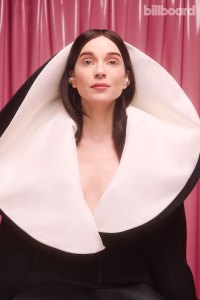
St. Vincent wearing Ultra Open Earbuds by @Bose and Maggi Simpkins.
Lenne Chai
Perhaps more significantly, All Born Screaming is also the first of her own albums on which she is credited as sole producer (though she has co-produced more than half of her discography).
“I don’t think I could have made this record any other way. I don’t think I would have written these songs or explored this stuff without the solitude,” she says. “Around 2019 [I thought], ‘OK, I eventually just want to produce my own work.’ When I was making Daddy’s Home, I started making a plan for my engineer, Cian Riordan, to make my studio proper — to get more into the engineering side, hone my chops and build a playground for myself. But if I’m honest, the seed was planted earlier, because by the time I was 14 or 15 I was recording myself in my bedroom.” (Clark’s studio is in Los Angeles; she splits her time among New York, L.A. and Texas.)
A 2023 study of popular songs by the Annenberg Inclusion Initiative found that just 3.4% of hits were produced by women in 2022, and Clark is still one of very few female producers finding success in the music business — with plenty more, she notes, deserving attention. “There are lots of women making their music DIY-style, and that is production,” she says. “My friend Cate Le Bon [who guests on All Born Screaming’s title track] is a great example of someone who produces herself and other people.” (The album also features drumming from Dave Grohl, Josh Freese and Warpaint’s Stella Mozgawa.)
When it comes to ways to increase LGBTQ+ inclusion in the industry, Clark is reluctant to provide any glib or easy answers. “The answer is, ‘Of course,’ but I can’t go, ‘If we only changed this policy.’ ” The Texas-raised Clark does not, however, hold back when asked about Republican Gov. Greg Abbott, who she says is waging “an absolute war on women and reproductive rights. That dude sucks. He sucks. I hate that dude.” For a brief moment, she sounds like an exasperated teenager ranting about her high school principal, but soon regains her poise. “What I love about Texas is the toughness and the grit. You can’t be too highfalutin. With love, they’ll knock you down a peg.” She looks thoughtful. “I did run away when I was 18, but at the same time, if you asked me to name parts of my identity, ‘Texan’ would be up there.”
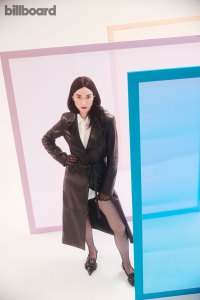
St. Vincent wearing Ultra Open Earbuds by @Bose and Maggi Simpkins. CAMILLA AND MARC shirt, Nour Hammour coat, Zhilyova gloves, JW PEI shoes.
Lenne Chai
As an artist who has explored both identity and technology deeply, Clark is cautiously intrigued by the musical potential of artificial intelligence in the hands of artists. “The tool is as interesting as its holder,” she says, then flashes a mischievous half-smile. “In some ways, I’m more concerned about artists sounding like AI than I am [about] AI sounding like artists.”
Clark is far more troubled by a more established technology in the digital music era. “If you are a big pop artist, streaming is fine. But there is some music that reaches you very deeply but isn’t music that you put on every single day. I’m not going to listen to John Coltrane’s A Love Supreme every day. It’s one of the most pivotal records of my life, but I’m not going to stream it over and over,” she says. “Streaming incentivizes songs to be consumable over and over again. Now, certainly there’s great music you want to consume like that — but there’s a lot of music that’s excellent and doesn’t fall into that category. And those artists, because of streaming, are wilting on the vine.” (St. Vincent’s catalog has accumulated a respectable 394.6 million official on-demand U.S. streams.)
Aside from friends like Le Bon, there are plenty of modern artists who keep Clark jazzed about music’s future. “I love Rosalía,” she says, leaning forward in her chair. “I saw her show last year. It was just art. It was so thoughtfully done. Post-modern choreography, flamenco. Just excellent.” All Born Screaming includes “Sweetest Fruit,” a tribute to the late trans artist SOPHIE, whom Clark deeply admired (though fan reaction to its literal lyrics was mixed). British rapper Little Simz is another favorite, and she lights up when talking about Willow. “She’s unbelievable. Her knowledge base and depth of reference is deep and varied. She’s pulling all these things together and making them her own, which is exactly what an artist should do.”
Whether speaking about her fellow artists, the music industry or her queer identity, Clark is animated and engaged; the only time she seems at a loss is when talking about how she fills her time that isn’t spent making music.
“I listen to a lot of audiobooks. Which is so boring,” she murmurs. “I work out. So boring.” Does she cook for herself? “Girl, no. Even playing Zelda, I would make dubious food.” Watch TV? “I will maybe watch something to fall asleep. I rewatched 30 Rock recently. I am obsessed with Girls5eva. It’s all the sensibility of 30 Rock, but with deep musical references. It makes me so happy.” Foster any unusual hobbies? “I walked into this bar across from Electric Lady [Studios in New York], but it was the wrong place — it was a coffee shop that turns into a knitting hour. I got the f–k out of there.”
After nearly two decades of making music professionally, Clark doesn’t seem fatigued or disenchanted by a business that often frustrates uncompromising creatives. If anything, she’s finding it easier to “trust in the process” with seven albums under her beloved trench’s belt. “There’s going to be speed bumps, and there’s going to be days when you don’t want to get out of bed. ‘Ugh, I can’t even face myself.’ And other days where you’re like, ‘Yeah, I am crushing it, wow!’ ”
Calling those polar mood swings “cancers to excise,” Clark says “it’s a miracle” she gets anything done. “The whole thing is chasing this feeling of being lit up and confused but excited at the same time,” she says. “It’s a bunch of people blowing into the same thing to make a balloon and, eventually, it rises. I don’t know how anything happens. I really don’t. The whole thing is mysterious. But I know if I focus on this little thing that I love, it will be OK.”
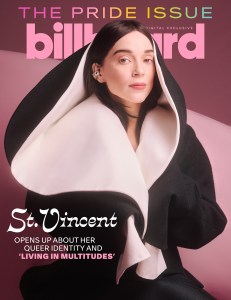
This story will appear in the June 22, 2024, issue of Billboard.

